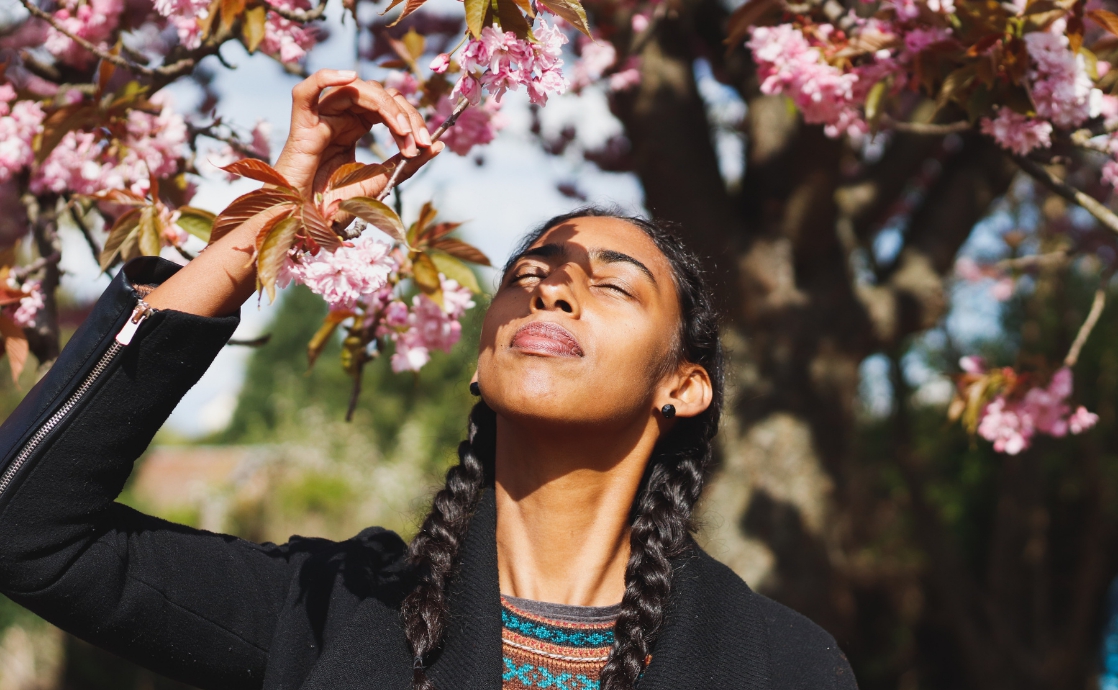The views expressed in our content reflect individual perspectives and do not represent the authoritative views of the Baha'i Faith.
Known for its ambition, New York City overflows with people who put their heads down and work, work, work until they reach their goal.
Those of us who live in this infamous city grind to make ends meet, to build careers, and to support our families.
As a young person deeply entrenched in a culture so focused on growth and movement, I sometimes find myself overly focused on the next thing on my bucket list. That ambition can motivate me, but I have started to notice how hard it can be to slow down, to be present in the moment, to step away from my life’s to-do list.
In my recent reflections I’ve realized that this tunnel vision leaves little time for gratitude. I have been told since I was a little girl that gratitude is so important to remember, and the Baha’i teachings bolster that advice:
Reflect, O people, on the grace and blessings of your Lord, and yield Him thanks at eventide and dawn. – Baha’u’llah, The Most Holy Book, p. 30.
Do you realize how much you should thank God for His blessings? If you should thank Him a thousand times with each breath, it would not be sufficient. – Abdu’l-Baha, The Promulgation of Universal Peace, p. 187.
In fact, this gratitude might attract the spiritual nourishment that often isn’t explicitly stated on the list of things we aim towards. We usually create these lists to either bring ourselves, or those around us, happiness. But our understanding of what creates happiness is limited by the understanding we as feeble individuals attain. Since not a single one of us knows all the secrets of the universe, our imagined recipe for happiness almost always falls short.
Though we may not have a perfect equation for concocting joy, scientific advances have begun to better understand one thing: expressing gratitude improves emotional and interpersonal benefits. Studies suggest the old advice of “counting your blessings” is actually being leveraged in therapeutic spaces to help people better navigate life.
Expressing Gratitude for Tests
Some of us have so much pain and agony it seems hard to find the silver lining—what do those of us who face trial after trial do?
Abdu’l-Baha, one of the central figures of the Baha’i Faith, assured us that even for the ones of us who never seem to get a break, there is still something to be thankful for:
Do not grieve at the afflictions and calamities that have befallen thee. All calamities and afflictions have been created for man so that he may spurn this mortal world — a world to which he is much attached. When he experienceth severe trials and hardships, then his nature will recoil and he will desire the eternal realm—a realm which is sanctified from all afflictions and calamities. Such is the case with the man who is wise. He shall never drink from a cup which is at the end distasteful, but, on the contrary, he will seek the cup of pure and limpid water. – Abdu’l-Baha, Selections from the Writings of Abdu’l-Baha, p. 239.
As the world sends trouble our way, it can be difficult to see the immediate lessons or benefits of the hardship we face. Baha’is believe that even when we cannot see the full picture, these tests will somehow benefit us.
Considering our limited capacity, humbly accepting that finding gratitude does something miraculous for us spiritually, even if we may not fully understand its influence, feels appropriate.
When I was a little girl and made my lists of what I was thankful for, perhaps as an activity in class for Thanksgiving, it often looked like: a house, my family, clothes, food, and school. As I’ve grown, lost people I’ve loved, and seen the way financial security and physical comfort can vacillate, it has become essential for me to establish an internal understanding of gratitude that supersedes comfort and material possessions:
But there is something else: detachment. We can appreciate without attaching ourselves to the things of this world … While enjoying the things of this world we must remember that one day we shall have to do without them. – Abdu’l-Baha, Divine Philosophy, pp. 135-136.
Additionally, my understanding of what it meant to be thankful or gracious was limited to these lists I made. Simply keeping in mind what good I have been offered is not necessarily the deepest form of gratitude, the same way saying thank you does not equate truly feeling thankful:
Thankfulness is of various kinds. There is a verbal thanksgiving which is confined to a mere utterance of gratitude. This is of no importance because perchance the tongue may give thanks while the heart is unaware of it. Many who offer thanks to God are of this type; their spirits and hearts unconscious of thanksgiving. This is mere usage, just as when we meet, receive a gift and say thank you, speaking the words without significance. … When man in response to the favors of God manifests susceptibilities of conscience, the heart is happy, the spirit is exhilarated. These spiritual susceptibilities are ideal thanksgiving. There is a cordial thanksgiving, too, which expresses itself in the deeds and actions of man when his heart is filled with gratitude. For example, God has conferred upon man the gift of guidance, and in thankfulness for this great gift certain deeds must emanate from him. To express his gratitude for the favors of God man must show forth praiseworthy actions. In response to these bestowals he must render good deeds, be self-sacrificing, loving the servants of God, forfeiting even life for them, showing kindness to all the creatures… Whatsoever he wishes to do must be in harmony with the good pleasure of God. He must observe and see what is the will of God and act accordingly. There can be no doubt that such commendable deeds are thankfulness for the favors of God. – Abdu’l-Baha, The Promulgation of Universal Peace, p. 236.
















Comments
Sign in or create an account
Continue with Googleor